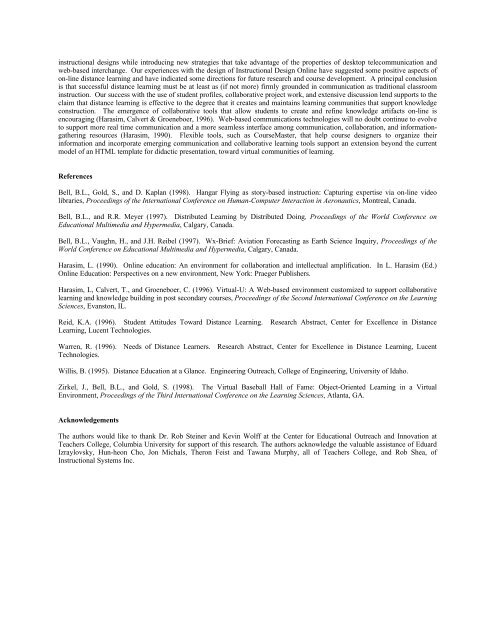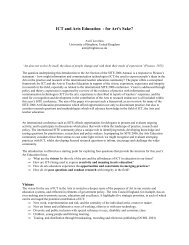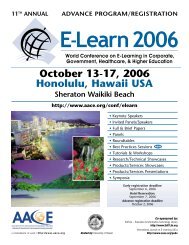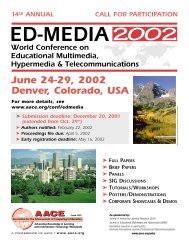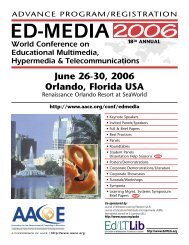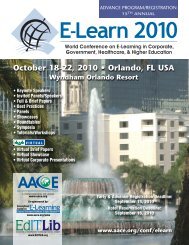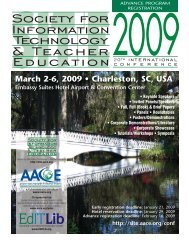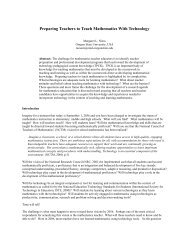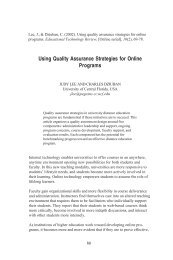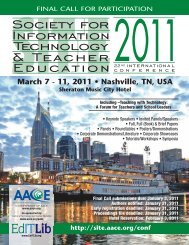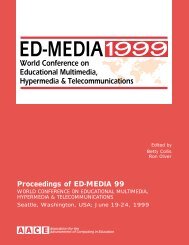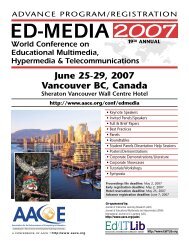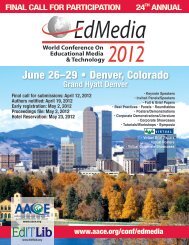ED-MEDIA 1999 Proceedings Book - Association for the ...
ED-MEDIA 1999 Proceedings Book - Association for the ...
ED-MEDIA 1999 Proceedings Book - Association for the ...
You also want an ePaper? Increase the reach of your titles
YUMPU automatically turns print PDFs into web optimized ePapers that Google loves.
instructional designs while introducing new strategies that take advantage of <strong>the</strong> properties of desktop telecommunication and<br />
web-based interchange. Our experiences with <strong>the</strong> design of Instructional Design Online have suggested some positive aspects of<br />
on-line distance learning and have indicated some directions <strong>for</strong> future research and course development. A principal conclusion<br />
is that successful distance learning must be at least as (if not more) firmly grounded in communication as traditional classroom<br />
instruction. Our success with <strong>the</strong> use of student profiles, collaborative project work, and extensive discussion lend supports to <strong>the</strong><br />
claim that distance learning is effective to <strong>the</strong> degree that it creates and maintains learning communities that support knowledge<br />
construction. The emergence of collaborative tools that allow students to create and refine knowledge artifacts on-line is<br />
encouraging (Harasim, Calvert & Groeneboer, 1996). Web-based communications technologies will no doubt continue to evolve<br />
to support more real time communication and a more seamless interface among communication, collaboration, and in<strong>for</strong>mationga<strong>the</strong>ring<br />
resources (Harasim, 1990). Flexible tools, such as CourseMaster, that help course designers to organize <strong>the</strong>ir<br />
in<strong>for</strong>mation and incorporate emerging communication and collaborative learning tools support an extension beyond <strong>the</strong> current<br />
model of an HTML template <strong>for</strong> didactic presentation, toward virtual communities of learning.<br />
References<br />
Bell, B.L., Gold, S., and D. Kaplan (1998). Hangar Flying as story-based instruction: Capturing expertise via on-line video<br />
libraries, <strong>Proceedings</strong> of <strong>the</strong> International Conference on Human-Computer Interaction in Aeronautics, Montreal, Canada.<br />
Bell, B.L., and R.R. Meyer (1997). Distributed Learning by Distributed Doing, <strong>Proceedings</strong> of <strong>the</strong> World Conference on<br />
Educational Multimedia and Hypermedia, Calgary, Canada.<br />
Bell, B.L., Vaughn, H., and J.H. Reibel (1997). Wx-Brief: Aviation Forecasting as Earth Science Inquiry, <strong>Proceedings</strong> of <strong>the</strong><br />
World Conference on Educational Multimedia and Hypermedia, Calgary, Canada.<br />
Harasim, L. (1990). Online education: An environment <strong>for</strong> collaboration and intellectual amplification. In L. Harasim (Ed.)<br />
Online Education: Perspectives on a new environment, New York: Praeger Publishers.<br />
Harasim, L, Calvert, T., and Groeneboer, C. (1996). Virtual-U: A Web-based environment customized to support collaborative<br />
learning and knowledge building in post secondary courses, <strong>Proceedings</strong> of <strong>the</strong> Second International Conference on <strong>the</strong> Learning<br />
Sciences, Evanston, IL.<br />
Reid, K.A. (1996). Student Attitudes Toward Distance Learning. Research Abstract, Center <strong>for</strong> Excellence in Distance<br />
Learning, Lucent Technologies.<br />
Warren, R. (1996). Needs of Distance Learners. Research Abstract, Center <strong>for</strong> Excellence in Distance Learning, Lucent<br />
Technologies.<br />
Willis, B. (1995). Distance Education at a Glance. Engineering Outreach, College of Engineering, University of Idaho.<br />
Zirkel, J., Bell, B.L., and Gold, S. (1998). The Virtual Baseball Hall of Fame: Object-Oriented Learning in a Virtual<br />
Environment, <strong>Proceedings</strong> of <strong>the</strong> Third International Conference on <strong>the</strong> Learning Sciences, Atlanta, GA.<br />
Acknowledgements<br />
The authors would like to thank Dr. Rob Steiner and Kevin Wolff at <strong>the</strong> Center <strong>for</strong> Educational Outreach and Innovation at<br />
Teachers College, Columbia University <strong>for</strong> support of this research. The authors acknowledge <strong>the</strong> valuable assistance of Eduard<br />
Izraylovsky, Hun-heon Cho, Jon Michals, Theron Feist and Tawana Murphy, all of Teachers College, and Rob Shea, of<br />
Instructional Systems Inc.


